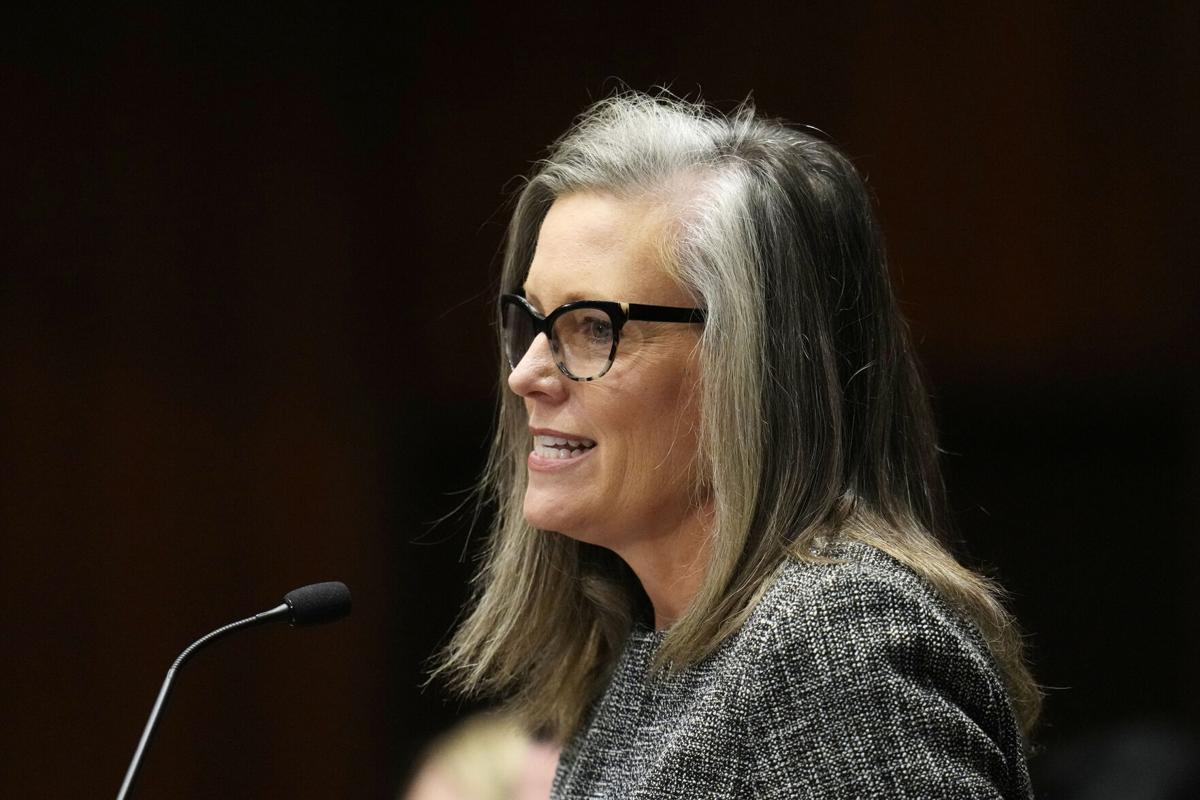PHOENIX — Arizona’s governor has stopped the state from blocking transgender students from using restrooms and locker rooms that do not match their sex as assigned at birth.
In a short veto message Thursday, Democratic Gov. Katie Hobbs called the legislation “yet another discriminatory act against LGBTQ+ youth passed by the majority at the state Legislature.’’
Hobbs, who earlier nixed legislation forbidding teachers from using a student’s preferred pronoun, warned the Republicans who control the House and Senate not to send her similar measures.
“I will veto every bill that aims to attack and harm children,’’ she wrote.
Hobbs vetoed four other measures Thursday, bringing her total so far this legislative session to 110.
Other rejected legislation includes:
Requiring Pima and Maricopa counties to provide at least one polling location in each legislative district that allows voters with early ballots to come in and have them tabulated on site. Hobbs said the requirement “presents significant logistical and cost challenges for election administrators that are left unresolved by this bill.”
Barring any election officer or appointee from being a member of any political action committee. She called it a solution in search of a problem that may not even exist.
Increasing the amount of money individuals can divert from income taxes owed to the state to instead fund scholarships for students to attend private and parochial schools. Hobbs said such credits reduced state income tax collections more than $271.8 million last year, a move that “diverts much needed funding from our public schools.’’
Requiring the Elections Procedures Manual, now prepared by the secretary of state with approval of the governor and attorney general, to be approved by the Joint Legislative Audit Committee. She called the measure another example of “legislative meddling with Arizona elections.’’
‘Reasonable accommodation’
The measure on restrooms and locker rooms at public schools was the most controversial.
It would have required schools to provide a “reasonable accommodation’’ to a student who is unwilling or unable to use a facility that matches their sex assigned at birth.
The accommodation could have included a single-occupancy room, a room for faculty or staff, or allowing students to use a restroom or locker room for the opposite sex when no one of that sex was present.
The legislation would also have applied to sleeping facilities during any overnight school trips.
It defined “sex’’ as “determined by anatomy and genetics existing at the time of the person’s birth’’ as evidenced by a document that reflects the individual’s birth certificate.
The measure also would have allowed anyone who encountered someone of the opposite sex in a multi-occupancy restroom or changing facility to file suit and recover claims for all psychological, emotional and physical harm suffered.
Sen. John Kavanagh, R-Fountain Hills, called the legislation a matter of common sense.
“Modesty is a basic universal and historic human instinct,’’ he said during debate on the measure. “It goes back to Adam and Eve hiding behind the bush after the apple was eaten.’’
“A school rule or a state law or a court decision cannot change that natural instinct of modesty,’’ he said. “And I think we have to respect that.’’
‘Open-minded’ young people
Sen. Christine Marsh, D-Phoenix, said such legislation would further isolate transgender students and cause harm.
“They are at immediate risk for all kinds of things, particularly suicide,’’ she said.
Marsh said there is another solution. She said if some students do not feel comfortable using a facility with a transgender individual, perhaps they should be the ones who have to use those “reasonable accommodations’’ rather than singling out the transgender students.
Kavanagh called that unworkable. “That would be an unbelievable burden upon our schools and take valuable funding away,’’ he said.
“Quite frankly, I don’t know what the percentage of transgender students are,’’ Kavanagh said. “But I suspect it’s well under 1%,’’ meaning schools would have to provide special accommodations for the other 99%.
Marsh wasn’t convinced.
“Well, 99% of the kids aren’t going to be offended or have a problem sharing a bathroom because our young people are remarkably open-minded,’’ she said.
Kavanagh said the legislation was about more than about bathrooms with separate stalls.
“There’s something terribly wrong with making a 15-year-old high school freshman coed stand naked in the school shower next to a naked 16-year-old biological male who may identify as female,’’ he said.
Marsh said that problem is easily resolved if schools are required to install shower curtains. Curtains make sense, regardless of who is using the shower, she said.
Previous attempts
This isn’t Kavanagh’s first effort to define such issues in Arizona law.
A decade ago he proposed making it a crime for someone to use a restroom, shower or locker room that did not match the person’s gender. That measure covered not just schools but any public facilities. Violators could have gone to jail for up to six months.
It ran into several practical issues, including whether some people might be forced to carry around a birth certificate.
Kavanagh then revamped the measure to instead give business owners immunity from civil and criminal prosecution if they turn away someone from a restroom based on the belief of the owner or manager that person should not be using the facility. That variant proved no more successful.
The senator called his new measure a compromise. “It’s trying to give something for everybody but respecting modesty,’’ Kavanagh said.
In a prepared statement following the veto, he said Democratic lawmakers and Hobbs “are catering to an extremist culture by pushing ‘gender neutrality’ as a means to win political points from their liberal base while stealing dignity away from women and girls in the process.’’
Get your morning recap of today's local news and read the full stories here: http://tucne.ws/morning





